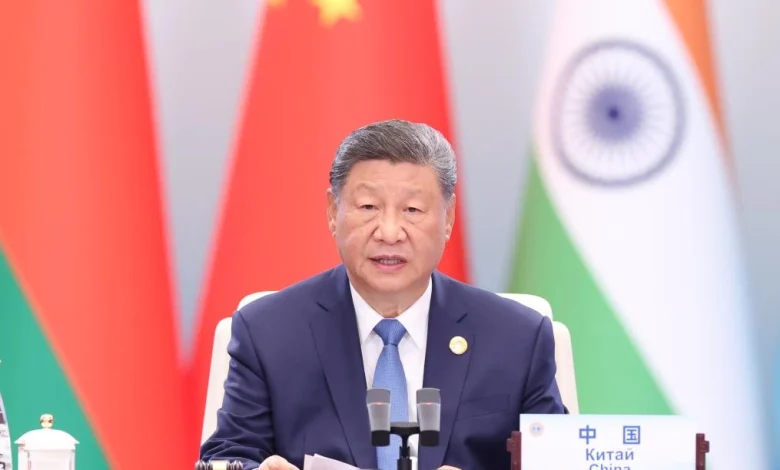
Xi Leads Push for New World Order with Putin
Chinese President Xi Jinping welcomed 20 world leaders to the Shanghai Cooperation Organization (SCO) summit, including Russia’s Vladimir Putin and India’s Narendra Modi. This gathering marked a significant step toward reshaping the global order. Xi took a strong stance against what he called “bullying behavior” and “Cold War mentality” from other nations. His message positioned the SCO as a clear alternative to Western-dominated international organizations.
Xi backed his words with substantial financial commitments. He announced 2 billion yuan ($280 million) in free aid to SCO member states this year. The package included an extra 10 billion yuan ($1.4 billion) in loans to an SCO banking consortium spread over the next three years. Xi’s “Global Governance Initiative” lacked specific details, yet the summit highlighted the strengthening alliance between China and Russia[-5]. Putin expressed his support by praising the SCO’s role in bringing back “genuine multilateralism.” His country has developed stronger economic and security connections with China since the Ukraine war began. Modi’s presence at the summit revealed the intricate diplomatic relationships within this emerging power bloc. China has poured $84 billion into other SCO countries and supported 10,000 students through Beijing’s “Luban” vocational education program.
Xi Jinping unveils vision for multipolar world order
Image Source: Xinhua
Chinese President Xi Jinping showed his ambitious vision for a new global order at the SCO summit in Tianjin. He stood before leaders from 20 countries to state a framework that would reshape international relations and lift China’s leadership role.
Xi criticizes hegemonism and Cold War mentality
Xi Jinping’s address targeted what he saw as outdated approaches to international relations. “We must continue to take a clear stand against hegemonism and power politics, and practice true multilateralism,” Xi declared. His remarks were widely seen as criticism of the United States. Xi repeatedly condemned the “Cold War mentality,” “hegemonism,” and “bullying practices” without naming America directly. Beijing often uses these terms when criticizing Washington.
The Chinese leader stated that “the house rules of a few countries should not be imposed on others.” He supported a system where nations participate as equals. Xi called for removing barriers between economies instead of creating new ones. “We should continue to dismantle walls, not erect them; seek integration, not decoupling,” he stated.
Global South positioned as new center of power
The life-blood of Xi’s vision places the Global South as the new center of global influence. His strategy builds on the fact that developing nations make up most UN member states and global population. He argues that allowing a small Western elite to dictate international norms goes against democratic principles.
China emerges as the natural leader of this bloc in Xi’s view. He believes China can change international structures to reflect developing countries’ interests and priorities better. “We should support equal and orderly multi-polarization of the world, inclusive economic globalization and promote the construction of a more just and equitable global governance system,” Xi emphasized.
Xi Jinping news explains Global Governance Initiative
Xi formally presented his Global Governance Initiative (GGI), which follows his earlier frameworks on development, security, and civilization. “I look forward to working with all countries for a more just and equitable global governance system,” he announced.
The initiative presents five core principles: sovereign equality, international rule of law, multilateralism, people-centered governance, and action-oriented implementation. Xi described this moment as crucial, noting “Global governance has reached a new crossroads”.
The GGI seeks to increase developing nations’ representation in international institutions. It challenges Western-dominated global structures that emerged after World War II. This initiative stands as China’s clearest attempt to outline its vision for an alternative world order.
SCO leaders back Xi’s challenge to U.S.-led system
Image Source: Yahoo
Chinese President Xi Jinping’s challenge to Western dominance received strong support from Eurasian leaders at the SCO summit. This backing marks a major change in regional power dynamics. Member states now look to China more frequently for leadership.
Putin praises Eurasian security model
Russian President Putin stood out as Xi Jinping’s strongest ally at the summit and strongly supported China’s vision for regional security. He praised the “Eurasian security model” as better than Western alternatives. The Russian leader described it as “indivisible” and “not built at the expense of others.” He pointed to the SCO as an example of “genuine multilateralism” that contrasts with what he called the “pseudo-rules-based order” promoted by the West.
Modi-Xi Jinping meeting signals thaw in relations
The Modi-Xi Jinping meeting on the summit’s sidelines was their first meaningful dialog in almost five years. This meeting pointed to possible normalization of Sino-Indian relations after the border clashes in 2020. Both leaders agreed to accelerate the disengagement of troops along disputed Himalayan frontiers. Modi described the talks as “positive and constructive.” This diplomatic progress happened even though India continues to participate in the Quad security dialog with the United States, Japan, and Australia – a group Beijing views with concern.
BRICS summit Xi Jinping absence contrasts with SCO presence
Xi Jinping played a prominent role at the SCO summit but skipped last month’s BRICS summit in Russia. Diplomatic analysts see this selective participation as Beijing’s strategic focus on the SCO as its preferred multilateral platform. The Chinese leader’s choice highlights the SCO’s growing role as an institutional alternative to Western-led organizations. This importance becomes more evident as the organization expands to include Iran and Belarus as full members, with countries like Turkey maintaining observer status.
China proposes economic and tech alternatives to West
Image Source: The Seattle Times
Chinese President Xi Jinping revealed a bold economic and technological agenda that gives SCO members concrete alternatives to Western-dominated global systems.
Xi calls for SCO Development Bank and AI center
Chinese President Xi Jinping pushed to speed up creation of a new SCO Development Bank as an alternative to Western-led financial institutions. The bank would work like the BRICS New Development Bank and Asian Investment Infrastructure Bank. Xi also announced plans for an SCO AI cooperation center, which he called “the cornerstone of the SCO’s next phase of development”. This center would let member states share a platform for research and applications.
China pledges $280M in aid and $1.4B in loans
Xi showed China’s commitment by pledging 2 billion yuan ($280 million) in grants to SCO member states this year. He also promised 10 billion yuan ($1.4 billion) in loans to the SCO Interbank Consortium over three years. China’s investment in other SCO nations has grown beyond $84 billion, and yearly bilateral trade now tops $500 billion. The plan also includes 100 “small and beautiful” livelihood projects in member states.
BeiDou satellite system offered to SCO members
Xi formally invited SCO countries to use China’s BeiDou satellite navigation system, which competes directly with U.S.-controlled GPS. This offer gives members a major technological alternative to Western systems. The International Civil Aviation Organization recognizes BeiDou as a global standard, and the system now runs on 98% of Chinese smartphones and shared bikes.
China invites SCO to join lunar research station
Xi invited countries with the right capabilities to join China’s International Lunar Research Station project. Beyond space projects, China promised 1,000 training spots in digital technology over three years. The country will also work with SCO members to boost installed capacity of photovoltaic and wind power by 10 million kilowatts each in the next five years.
Geopolitical tensions rise amid U.S. tariffs and Ukraine war
Image Source: Nature
Geopolitical divisions grew deeper as the SCO summit played out amid rising trade tensions and the ongoing conflict in Ukraine.
Trump-Xi Jinping trade war context resurfaces
The economic conflict between the U.S. and China has grown more intense. The second Trump administration slapped 145% tariffs on Chinese goods, which led Beijing to hit back with 125% tariffs on American products. This escalation has led to a projected 0.2% drop in global merchandise trade. Both nations have carefully chosen to exempt certain products, and the U.S. left out Chinese smartphones and semiconductors from these tariffs.
India and China face U.S. tariffs over Russian oil
The White House has imposed 50% tariffs on Indian imports—ranking among the world’s highest—to target New Delhi’s purchases of discounted Russian oil. These purchases, according to the White House, help fund Russia’s war in Ukraine indirectly. Goldman Sachs has warned that these tariffs could push India’s GDP growth below 6%. China, another major buyer of Russian oil, hasn’t faced similar penalties yet.
Putin defends Ukraine war and blames Western provocation
Putin strongly denied responsibility for the Ukraine conflict at the SCO summit. “This crisis was not triggered by Russia’s attack on Ukraine, but was a result of a coup in Ukraine, which was supported and provoked by the West,” Putin declared. He pointed to Ukraine’s 2013-2014 pro-European revolution and “the West’s constant attempts to drag Ukraine into NATO” as his justification.
The SCO summit represents a defining moment that is changing global power dynamics. Chinese President Xi Jinping has positioned the organization to counter Western-dominated institutions and established China’s leadership role in the Global South. His vision of a multipolar world order, backed by $280 million in aid and $1.4 billion in loans, shows Beijing’s commitment to turn words into action.
President Putin has become China’s strongest ally in this attempt. Both leaders aim to challenge what they call Western hegemony, though their approaches differ. Xi and Modi’s unexpected reconciliation proves that countries with competing interests see value in the SCO framework while keeping their independence.
China’s technological offerings go beyond diplomatic moves. The BeiDou satellite system and AI cooperation center reveal a complete strategy to build systems free from Western control. These projects, along with the proposed SCO Development Bank, build the practical foundation of Xi’s alternative world order.
The summit took place amid rising tensions. The Ukraine war and renewed US-China trade conflicts loomed over the proceedings. Notwithstanding that, the gathering showed that much of the world is ready to accept Chinese leadership, whatever Western pressure exists.
Xi’s vision faces its real test in implementation. Words and promises must become working institutions that benefit member states. One fact stands clear—global power balance has changed. People might remember the SCO summit as the moment this new reality became impossible to ignore.






